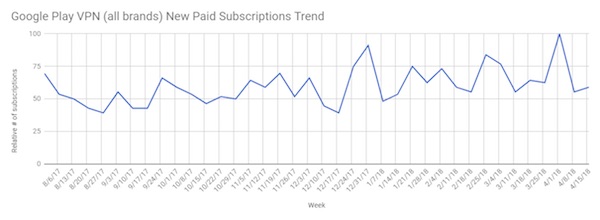
Data scandals like Facebook-Cambridge Analytica and the repeal of net neutrality are having a side effect: More people are taking steps to mask their internet browsing through virtual private network, or VPN, technology.
Once the preserve of the tinfoil hat crowds, VPN makers now advertise on TV and elsewhere with a simple message: Don’t be tracked online. It’s apparently resonating: Where data scandals were reported, VPN sales spiked in the U.S., nearly doubling in some instances, according to a new report from analytics company Edison Trends. The Edison VPN Report analyzed the timing of subscription purchases of VPN services, including Avast, Norton and NordVPN, across Google Play and the Amazon Appstore.
The report found that in the two weeks after Dec. 14, when the Federal Communications Commission voted to repeal net neutrality, paid subscriptions to VPNs on Google Play more than doubled, and subscriptions peaked in the weeks after Facebook’s data leak. The report found a similar outcome from analyzing VPN purchases on Amazon’s Appstore.


VPN use in North America is far from mainstream. Only 17 percent of the North American population uses a VPN, according to a GlobalWebIndex December 2017 survey of 89,029 internet users across 40 countries. The larger issue lies with marketers who are trying to target people internationally. The same report found that 25 percent of internet users globally used a VPN in the past month, and countries like Indonesia, India, Turkey and China all have 30 percent or more of their populations using VPNs.
“Part of the concern with the net neutrality issue is that [internet service providers] can now sell your data to advertising agencies,” said William McCormick, founder of marketing and public relations agency Pure Knot. “People understand that when they visit a website of their choice, they will get ads. What will really annoy consumers is when their data is being sold by a third party they didn’t consent to.”
The growing number of VPN downloads poses a problem to marketers when it comes to localized, IP-based targeting, said Hetal Pandya, co-founder of Edison Trends. Because a VPN service essentially gives a user an alternative ISP address, the original ISP address is unable to track the websites a user visits.
Sometimes free VPN services will sell this data to advertisers anyway, but VPNs that do charge users a fee usually encrypt a user’s data, making it so an ISP can only see that a user is connected to a VPN server.
“A VPN could say someone is in England when they are in the U.S., so local ads won’t be effective, which means the digital marketers’ results will be worse,” said Pandya.
The marketers that will not be affected from the rise of VPNs are those that rely on first-party cookie data from website visits, said Natasha Morgan, vp of marketing at data management company Umbel. “As VPN use rises,” said Morgan, “marketers using IP-based targeting through an ad network may have to find other approaches if they see a dip in conversions.”
But privacy isn’t the only reason why a user might download a VPN. In fact, the GlobalWebIndex study also found that 50 percent of VPN users downloaded one to access better entertainment content, while 31 percent did so to remain anonymous while browsing the internet. Either way, VPN companies are capitalizing on events like Facebook’s data scandal, hoping their promise of protecting user data will prompt more users to download VPNs in the wake of the platform’s mishaps.
NordVPN has posted and shared articles published to its site like “How to stop Facebook from sharing your info with third-party apps.” VPN.com, a VPN comparison site, is one company that is still leveraging the #DeleteFacebook hashtag that trended on social media around the time of the Facebook hearings. On April 18, about a week after CEO Mark Zuckerberg testified before Congress about the Facebook- Cambridge Analytica scandal, VPN.com started protests in Austin, Texas; Atlanta; San Francisco; and Washington, D.C. with 24-foot trucks sporting the hashtags #DeleteFacebook and #OurPrivacyMatters.
Our #DeleteFacebook protests are live in Washington DC, San Francisco, Atlanta, and Austin. We believe privacy is a civil right and are dedicated to fighting for you. Please visit https://t.co/xJjbGfHBCM or DM for more details on how to get involved. pic.twitter.com/sb3KOTwbD7
— VPN.com (@theofficialvpn) April 20, 2018
These VPN companies’ efforts might be working. Across social media, conversations around VPNs spiked April 9, the day Facebook alerted users of its data misuse. Mentions of “VPN” and “Virtual Private Network” skyrocketed to above 50,000, according to Brandwatch data.
“VPNs are heavily marketed as the answer to data security, and the public is clearly responding to that,” said Morgan. “With data breaches like Equifax and data misuse like Cambridge Analytica, people may feel like they don’t have full control of their data online and, as we see the effects of net neutrality’s repeal, and more and more people spend time online to consume content, VPN use will not slow down.”
More in Marketing

YouTube’s upmarket TV push still runs on mid-funnel DNA
YouTube is balancing wanting to be premium TV, the short-form powerhouse and a creator economy engine all at once.

Digiday ranks the best and worst Super Bowl 2026 ads
Now that the dust has settled, it’s time to reflect on the best and worst commercials from Super Bowl 2026.

In the age of AI content, The Super Bowl felt old-fashioned
The Super Bowl is one of the last places where brands are reminded that cultural likeness is easy but shared experience is earned.








